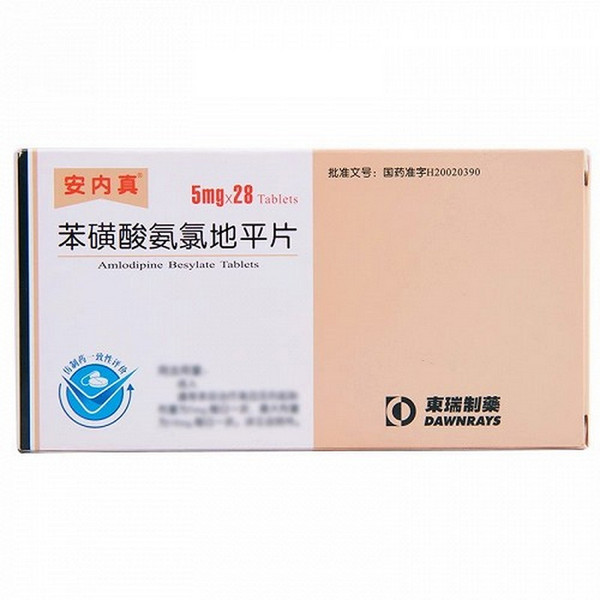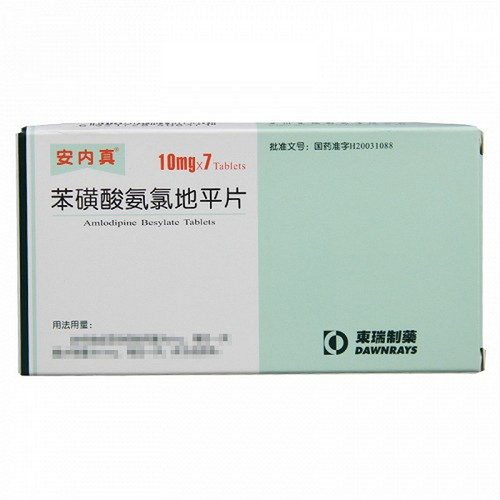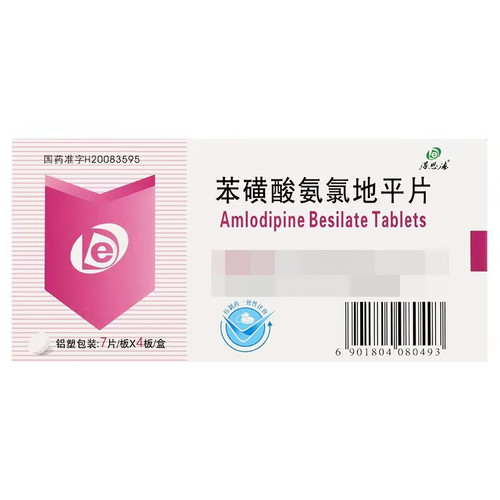Product Overview
[Drug Name]
Generic Name: Amlodipine Besylate Tablets
Trade Name: An Nei Zhen
English Name: Amlodipine Besylate Tablets
Chinese Pinyin: Benhuangsuan Anlvdiping Pian
[Ingredients]
The main ingredient of this product is amlodipine besylate. Molecular formula: C20H25ClN2O5C6H6O3S. Molecular weight: 567.1
[Appearance]
This product is white or off-white tablets.
[Indications]
1. Hypertension. This product can be used alone or in combination with other antihypertensive drugs. 2. Chronic stable angina and variant angina. This product can be used alone or in combination with other antianginal drugs.
[Dosage and Administration]
1. Treatment of hypertension: Initial dose: 5 mg once daily, maximum dose: 10 mg once daily. For frail or elderly patients, or those with hepatic impairment, the initial dose is 2.5 mg (amlodipine besylate tablet: half a tablet) once daily. This dose may also be used in addition to other antihypertensive medications. The dose should be adjusted based on individual patient response, and dose adjustments should generally begin after 7-14 days. If clinically necessary, dose adjustments may be initiated sooner under close patient monitoring.
2. Treatment of angina pectoris: The initial dose is 5 mg-10 mg once daily. Lower doses are recommended for elderly patients and those with hepatic impairment. The effective dose for most patients is 10 mg/day.
[Adverse Reactions]
Amlodipine is well tolerated. In placebo-controlled clinical trials for the treatment of hypertension or angina pectoris, the most common adverse events were: 1. Autonomic nervous system: flushing 2. General: fatigue 3. Cardiovascular, general: edema 4. Central and peripheral nervous system: dizziness, headache 5. Gastrointestinal: abdominal pain, nausea 6. Heart rate/rhythm: palpitations 7. Psychological: drowsiness No significant clinical laboratory abnormalities related to this product were found in these clinical trials. Less common adverse events observed post-marketing include: 1. Autonomic nervous system: dry mouth, increased sweating 2. Systemic: weakness, back pain, malaise, pain, weight gain/loss 3. Cardiovascular, general: hypotension, syncope 4. Central and peripheral nervous system: hypertonia, hypoesthesia/paresthesia, peripheral neuropathy, tremor 5. Endocrine: breast hyperplasia 6. Gastrointestinal: changes in bowel habits, dyspepsia (including gastritis), gingival hyperplasia, pancreatitis, vomiting 7. Metabolic/nutritional: hyperglycemia 8. Musculoskeletal: arthralgia, muscle cramps, myalgia 9. Platelets/bleeding/coagulation: purpura, thrombocytopenic purpura 10. Psychological: impotence, insomnia, attitude change 11. Respiratory system: cough, dyspnea 12. Skin/appendages: hair loss, skin discoloration 13. Special senses: taste disturbance, tinnitus 14. Urinary system: frequent urination 15. Vascular (Extracardiac): Vasculitis 16. Vision: Visual impairment 17. Leukocyte/Reticuloendothelial System: Leukopenia 18. Hypersensitivity reactions are rare and include pruritus, rash, vasogenic edema, and erythema multiforme. 19. Very rare cases of hepatitis, jaundice, and elevated transaminases (usually associated with cholestasis) have been reported. Some severe cases requiring hospitalization have been reported in association with amlodipine use. However, in most cases, a causal relationship has not been established. Similar to other calcium channel blockers, the following adverse events have been reported rarely, but these events are difficult to distinguish from the natural history of the underlying disease: myocardial infarction, arrhythmias (including bradycardia, ventricular tachycardia, and atrial fibrillation), and chest pain.
[Contraindications]
This product is contraindicated in patients with hypersensitivity to dihydropyridines or any of its components.
[Precautions]
1. Warning: A very small number of patients, particularly those with severe coronary artery obstructive disease, may experience increased frequency, prolonged duration, and/or worsening of angina pectoris, or acute myocardial infarction, when initiating calcium channel blocker therapy or increasing the dose. The mechanism of action is currently unknown. 2. Because the vasodilatory effect of this drug is gradual, rare cases of acute hypotension have been reported following administration of this drug. However, caution should be exercised when using this drug in combination with other peripheral vasodilators in patients with severe aortic stenosis. 3. Use in Patients with Heart Failure: Calcium channel blockers should be used with caution in patients with congestive heart failure. In a long-term, placebo-controlled study (PRAISE-2) in patients with non-ischemic heart failure (NYHA class III-IV), although the incidence of exacerbations of heart failure was not significantly different from placebo, there was an increase in reports of amlodipine-related pulmonary edema. 4. Use in Patients with Impaired Hepatic Function: As with all calcium channel blockers, the half-life of this drug is prolonged in patients with impaired hepatic function. However, a recommended dose has not yet been established, so this product should be used with caution. 5. Use in Patients with Renal Failure: Changes in amlodipine plasma concentrations are not correlated with the degree of renal impairment. Therefore, a normal dose can be used. This product cannot be eliminated by dialysis.
[Use in Special Populations]
Precautions for Children:
Safety and efficacy in children have not been established.
Precautions for Pregnancy and Lactation:
There is a lack of research data on the use of this product in pregnant women, but based on animal studies, this product should only be used in pregnant women when absolutely necessary. It is unknown whether this product is excreted in breast milk; breastfeeding women taking this product should discontinue breastfeeding.
Precautions for the Elderly:
Clinical studies have not demonstrated that elderly individuals respond differently to this drug than younger individuals. However, given that elderly individuals often have impaired liver, kidney, and heart function, as well as other medical conditions and medications, the lower end of the initial dose range is generally used. Elderly individuals have decreased clearance of this product, with the area under the curve (AUC) increasing by approximately 40%-60%, necessitating a lower initial dose.
[Drug Interactions]
This product is safe for co-administration with the following medications: thiazide diuretics, alpha-adrenergic receptor blockers, beta-adrenergic receptor blockers, angiotensin-converting enzyme inhibitors, long-acting nitrates, sublingual nitroglycerin, nonsteroidal anti-inflammatory drugs, antibiotics, and oral hypoglycemic agents. In vitro data using human plasma indicate that this product does not affect the plasma protein binding of digoxin, phenytoin, warfarin, or indomethacin. Effects of Other Drugs on Amlodipine: 1. Cimetidine: Co-administration with cimetidine did not alter the pharmacokinetics of amlodipine. 2. Grapefruit Juice: Concomitant administration of 240 ml of grapefruit juice and 10 mg of amlodipine to 20 healthy volunteers did not significantly affect the pharmacokinetics of amlodipine. 3. Aluminum/Magnesium (Antacids): Concomitant administration of aluminum/magnesium antacids with a single dose of amlodipine did not significantly affect the pharmacokinetics of amlodipine. 4. Sildenafil (Viagra): A single 100 mg dose of sildenafil did not affect the pharmacokinetics of amlodipine in patients with essential hypertension. When used together, each drug exerts its antihypertensive effect independently. Effects of Amlodipine on Other Drugs: Atorvastatin: Coadministration of 10 mg of amlodipine and 80 mg of atorvastatin did not significantly alter the steady-state pharmacokinetic parameters of atorvastatin. Digoxin: Coadministration of amlodipine and digoxin did not alter plasma digoxin concentrations or renal clearance in normal volunteers. Ethanol: Single or multiple doses of 10 mg of amlodipine had no effect on the pharmacokinetics of ethanol. Warfarin: Coadministration of amlodipine and warfarin did not alter the prothrombin reaction time of warfarin. Cyclosporine: Pharmacokinetic studies have shown that amlodipine does not significantly alter the pharmacokinetics of cyclosporine. Drug/Laboratory Test Interactions: Unknown.
[Pharmacological Action]
Amlodipine is a calcium channel blocker (also known as a slow-channel blocker or calcium ion antagonist) that blocks the entry of extracellular calcium ions into myocardial and smooth muscle cells via calcium ion channels in the cell membrane. Its antihypertensive mechanism is direct relaxation of vascular smooth muscle. While the exact mechanism of angina relief is not fully determined, it may relieve angina by dilating peripheral arterioles and coronary arteries, reducing total peripheral vascular resistance, relieving coronary artery spasm, lowering cardiac afterload, and reducing energy expenditure and oxygen demand. A two-year study in rats and mice using amlodipine administered by diet at doses of 0.5 mg/kg/day, 1.25 mg/kg/day, and 2.5 mg/kg/day found no evidence of carcinogenicity. Induction studies revealed no drug-related effects at the genetic or chromosomal levels. Amlodipine at a dose of 10 mg/kg/day (8 times the maximum recommended human dose of 10 mg, calculated on a mg/m² basis) had no effect on reproductive capacity in rats.
[Storage] Store in a cool, dark place, sealed.
[Specification] 5mg x 28 tablets
[Packaging] Box
[Expiry Date] 24 months
[Approval Number] National Medicine Standard H20020390
[Manufacturer] Company Name: Suzhou Dawnray Pharmaceutical Co., Ltd.








